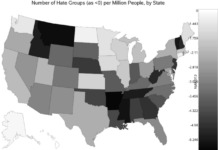
Since 2000, it’s been possible for undocumented immigrants who are victims of serious crimes to stay in this country for good, and potentially gain citizenship. By getting a special visa, undocumented immigrants who meet certain criteria no longer have to fear being deported. But a recent study reveals that a number of law enforcement agencies won’t even consider helping undocumented immigrants get these visas.
As part of the Victims of Trafficking and Violence Protection Act of 2000, Congress created the “U visa,” which allows an undocumented immigrant to stay in this country without fear of deportation if he or she is the victim of a serious crime–such as kidnapping, armed robbery, prostitution, rape, torture, and human trafficking. Once a police department, district attorney’s office, or judge verifies that the immigrant is cooperating with the investigation, the U visa application is then forwarded to Washington for review. A U visa holder can apply for permanent residency after four years–thus putting him or her on a pathway to citizenship.
However, a study by the University of North Carolina Law School’s Immigration/Human Rights Policy Clinic and ASISTA, an advocacy group for immigrant victims of domestic violence, revealed that at least 160 agencies around the country won’t even consider U visa applications. Many of those agencies are in areas where hostility to immigrants runs at a fever pitch.
For instance, the police department in Gastonia, North Carolina–a suburb of Charlotte–claims it doesn’t have the manpower to verify that immigrants have indeed been the victims of crime. But that seems hard to believe, given that only eight requests have come into the department for all of 2015–not even a fraction of the requests submitted to the Charlotte-Mecklenburg Police Department. According to Carolina law professor Deborah Weissman, it usually takes three weeks to verify most applications–which makes her wonder whether “elements of anti-immigrant sentiment” are at play.
Weissman isn’t the only one. Back in 2009, armed robbers barged into the home of a Mexican immigrant family in Gastonia. The mother, “Gladys,” reported the crime, and with her help, at least one of the robbers was sent to prison. While her husband is a permanent resident, Gladys is undocmented. Gladys asked for a U visa in 2012–and only got a form letter saying it would take time to process. She tried again this October–and got the same response. Not only is she afraid of being deported, but she chafes at not being able to get a better job. She thinks that whoever is responsible for processing U visa applications needs to know that “people are suffering from day to day.”
It makes you wonder–how many victims of domestic violence and human trafficking have been sitting and waiting for assurance that they won’t be deported for exercising their right to go to the police and demand the righting of a wrong? And how many crimes go unreported because immigrants live in communities where they have to fear being deported if they report a crime? Ana Suarez of the Latin American Coalition puts it better than I can–“The U visa makes communities safer.”
This can only be described as a travesty. Fortunately, something’s being done about it. California recently passed a law requiring police departments to verify U visa applications within 90 days unless there is a compelling reason to turn it down. And just this week, Gastonia city manager Ed Munn asked his police department to consider changes to its policy. Munn ensure that all crime victims in Gastonia, “whether they are citizens or non-citizens of our country,” are protected. At least Munn didn’t wait for someone to be killed or severely crippled to do something about his city’s travesty of a policy.




